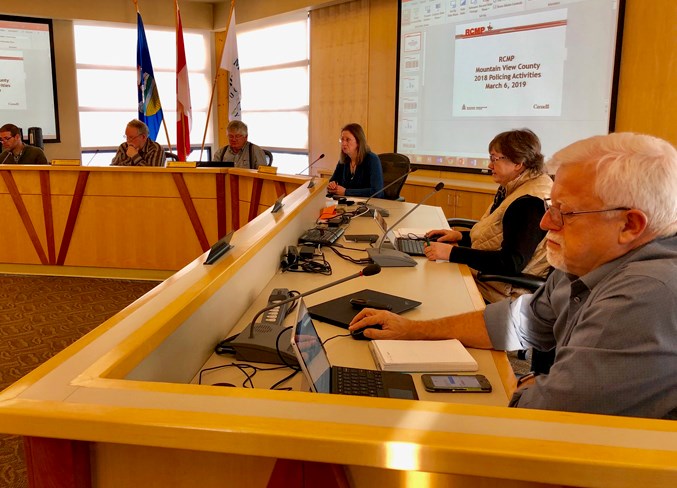Mountain View County council has approved creation of a new agricultural plastics recycling program for twine used by producers in the municipality. The program will include both a collection and education component.
A report on the program was presented to councillors at the recent regularly scheduled council meeting.
An existing county program for agricultural plastics recycling has been offered to county farmers since 2007.
“Moving forward the county’s agricultural recycling program is faced with challenges due to the loss of the collection site, baler and waste service provider,” director of legislative services Chris Atchison said in a briefing note to council.
“In review of the data collected, identification of materials with a reliable recycling stream and new provincial agricultural plastics pilot program, proposed (is a) revised program.”
Funding for the new program could largely come from the new provincial agricultural plastics pilot, council heard.
That pilot project’s goals include recycling grain bags and twine, as well as educating producers on how to recycle their plastics.
“After reviewing the provincial pilot project and the information made available, administration has developed a proposed agricultural recycling program to undertake within the county which is consistent with the goals and direction of the pilot project,” he said.
The new program would initially involve the collection of twine, and would include the purchase of a shipping container at the new county agriculture shop near the county office between Olds and Didsbury.
The shipping container would be used to store the recycled plastic materials for shipment.
“Once the appropriate development permits are received a Sea-Can would be purchased and placed in the southwest corner of the gated agricultural services yard,” he said.
“A schedule would be advertised for collection dates, ranging twice a month in spring and fall and once a month in summer. There would be staff available to ensure twine accepted meets the criteria for recycling.
“If it does not meet criteria, staff will work with the producer to salvage what can be recycled.”
Education and information will be provided to residents wishing to participate in the program to facilitate that the majority of material brought in can be accepted, he said.
“Staff would receive training to ensure consistent inspection and collection of twine meeting the desired recycling contamination thresholds,” he said.
The site at the ag service building would be capable of accommodating trucks with trailers for unloading, he said.
“A contractor has been found that is willing to accept the clean, dry and bagged twine,” he said.
“Sea-Cans were identified for the collection and storage of twine as they are mobile, can be used for transport and would keep the product clean and dry. A Sea-Can can also be easily sold or reused for other county purposes.”
Administration plans to consult with farmers and processors to determine if a grain bag collection program would be viable.
There will be a number of benefits realized by the new program, he said.
“Creating information for producers on how to collect clean, separated agricultural plastics will reduce the amount of agricultural plastics burned or buried and increase the amount of materials being recycled,” he said.
“By encouraging agricultural plastic recycling this will improve producers’ overall environmental performance and reduce air, soil and water contamination.”
Burning agricultural plastics, including twine, is illegal under the Alberta Environmental Protection and Enhancement Act.
Atchison commended county staff members for their work in putting the new program together for council’s consideration.
Coun. Greg Harris called the new program a good move for the community.
“I like this,” said Harris. “Start with your market and let’s provide what the market wants and needs; not try to recycle everything where we end up with bales and bales of stuff waiting for something.”
Director Atchison said: “That’s exactly the mentality we are trying to take. The last thing we want is a stockpile in the ag yard. If we are accepting material that is going to be landfilled, we are doing something wrong.”
Harris said: “By starting with what we have a market for and let’s recycle it, I like that approach. Down the road I would like to see it morph maybe instead of one location in the county, have Sea-Cans mobile on the back of a trailer.”
Coun. Al Kemmere said he is pleased to see the new program.
“Education is going to be so huge in this,” said Kemmere. “We want to make sure in our education piece on this that people don’t assume that because we are collecting twine, we are also collecting net wrap, because that is going to contaminate our stuff significantly.”
Kemmere called for the county to consult with Rocky View, Kneehill and Red Deer counties on issues of agricultural plastics recycling.
The timeline for opening the shipping container at the agriculture shop is still to be worked out, officials said.
A motion approving the new agricultural plastics recycling program was passed unanimously. Reeve Bruce Beattie did not attend the March 6 council meeting.



